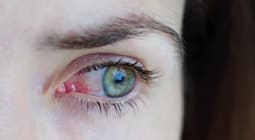What are Cataracts?
Cataracts are a natural part of the ageing process and occur most often in patients over 60 years old. As we age, the normally clear lens in the eye becomes cloudy. Cataracts can range from a relatively minor inconvenience to a significant visual impairment, if left untreated. Cataracts may develop slowly over several years or may form rapidly in a matter of months.
Though many of us will likely develop cataracts at some point during our lives, factors such as smoking, UV exposure, excessive alcohol consumption, high blood pressure, and diabetes all increase your risk of developing cataracts at a younger age.

Cataract Symptoms
Symptoms of cataracts include:
- Blurry vision
- Foggy vision
- Muted colour vision
- Increased susceptibility to glare
- Feeling like there is a film over your eye that will not go away

Cataract Prevention & Treatment
Though there is nothing you can do to specifically prevent cataracts, wearing UV protection sunglasses and eating foods rich in antioxidants (such as kale, broccoli, blueberries, prunes, and strawberries) can help promote good ocular health.
If your cataracts are only mildly disruptive, your optometrist may suggest workarounds such as using a magnifying aid or increased lighting when doing near activities, or wearing glasses treated with an anti-glare coating. However, if your cataracts begin to significantly impair your vision and activities, you may require cataract surgery. Cataract surgery involves removing your natural, cloudy lens and replacing it with an artificial lens.
OHIP Covers Cataract Surgery
The Ontario Health Insurance Plan (OHIP) covers all cataract surgeries and lens exchanges deemed medically necessary.
We can co-manage your cataract surgery with a specialist in Ottawa. From the initial consultation to follow-up appointments, we have you covered. Consult with your specialist first for their recommendations.
For more information about cataracts, including prevention and treatment options, please speak to your optometrist during your next appointment.















